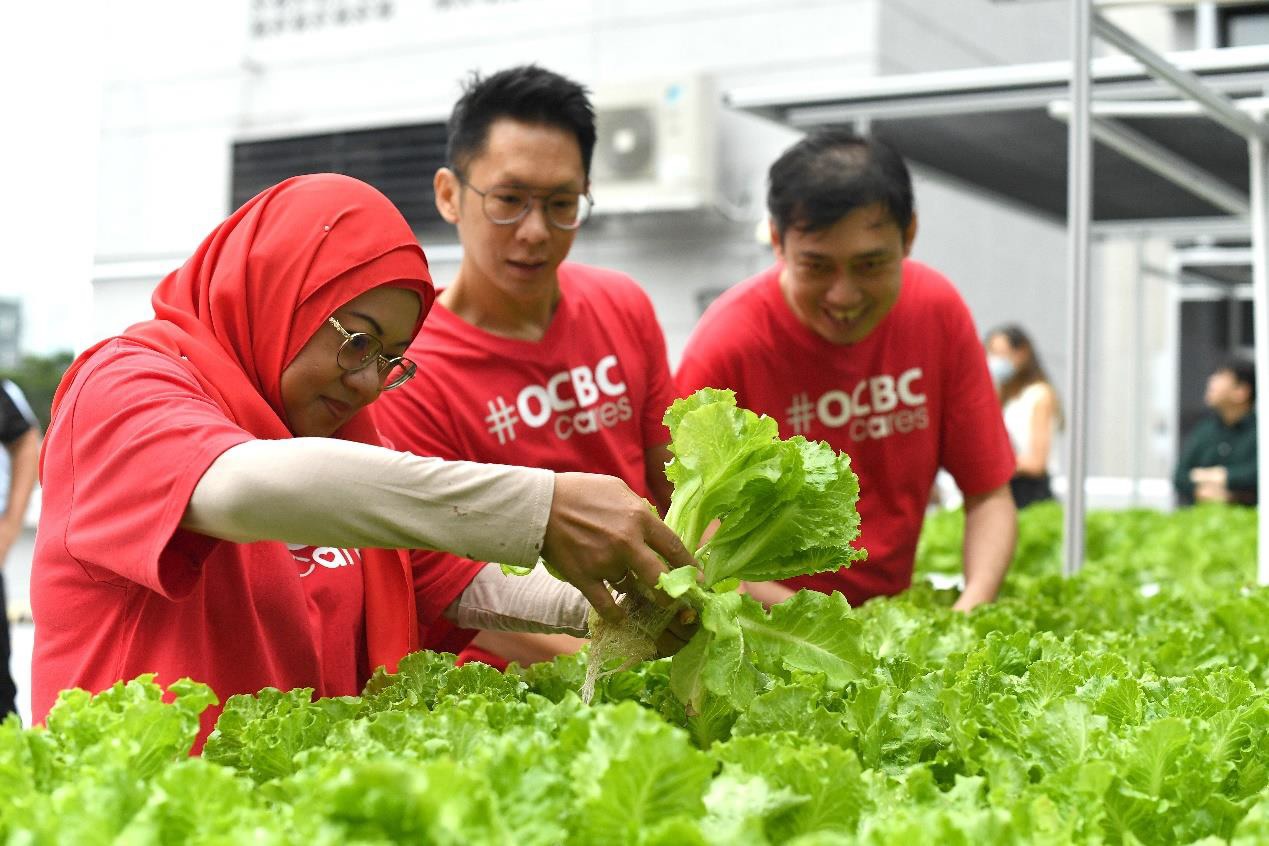OCBC Bank's Community Urban Farm Is The First In the Central Business District
OCBC Bank's Community Urban Farm Is The First In the Central Business District

An OCBC Bank volunteer in the process of harvesting a lettuce plant.
OCBC Bank today unveiled an employee-run community urban farm that has begun operations atop the OCBC Centre carpark in Singapore. The farm is expected to produce 140kg of vegetables annually, with today being the first harvest. The greens will be donated to Willing Hearts, a charity soup kitchen operated by volunteers, and will go into approximately 3,000 meals.
The farm covers a quarter of the area of the carpark roof, or 1,250 sq ft, and is the first community urban farm in the Central Business District. It was started in August this year and will soon expand from lettuce to other types of leafy green vegetables such as cai xin and xiao bai cai, some of the most common vegetables Singaporeans consume daily.
In place of traditional soil-based methods, the farm uses a hydroponic system, which is widely regarded as one of the most sustainable ways of food production. Hydroponic farming uses significantly less water compared to conventional farming. In a hydroponic setting, the water solution is reused and recirculated through pipes, returning excess water to the nutrient solution reservoir. Additionally, the vegetables can get nutrients directly from the solution, allowing them to develop quicker and free from diseases.
In line with the bank’s commitment to reduce carbon emissions through the deployment of energy-efficient technology, solar energy is harnessed to power the hydroponic system and charge the backup battery for use at night. The electrical grid is activated only when the batteries are depleted.
This initiative aims to support Singapore’s “30 by 30" goal of strengthening food resilience by producing 30% of the nation's nutritional needs locally and sustainably by 2030. With only 1% of its land available for food production, the nation imports over 90% of its food. This reliance on imported food will be lessened if more food can be produced locally, tapping into underused and integrated spaces to produce more in less space.
Beyond strengthening the nation’s food resilience, the farm also fosters a sense of community. An expected team of over 100 bank volunteers will join forces to shoulder year-round tasks like seeding, germination and harvesting the produce, under the guidance of urban agriculture experts.
Ms Lee Hwee Boon, Head of Group Human Resources, OCBC Bank, said, “With increased awareness around food security since the pandemic, a group of staff were inspired to explore how under-utilised spaces on the bank’s premises could be converted into urban farms. While the vegetables produced may not significant, it is still a step towards Singapore’s “30 by 30” goal. As an organisation, we are committed to shaping a more sustainable future and have empowered our staff to do the same. It is very encouraging to see ideas like this come to fruition, and we hope that more staff will step forward to champion similar ground-up initiatives in the future.”
For Ms Chong Siew Ching, Relationship Officer, OCBC Bank, a gardening enthusiast who volunteers at the farm, the opportunity to pursue a hobby at work – and for a meaningful cause – is something she appreciates.
“Caring for plants is therapeutic for me,” she said. “The time spent tending to our farm provides a break from work and a good way to unwind. I am also glad that all the vegetables we grow will go towards helping the less privileged. Being able to give back while doing something I enjoy is rewarding to me.”
For more information, please visit www.ocbc.com.
